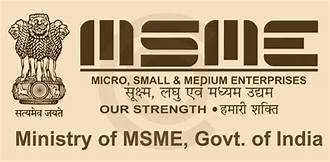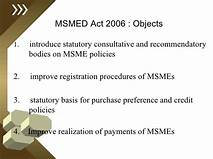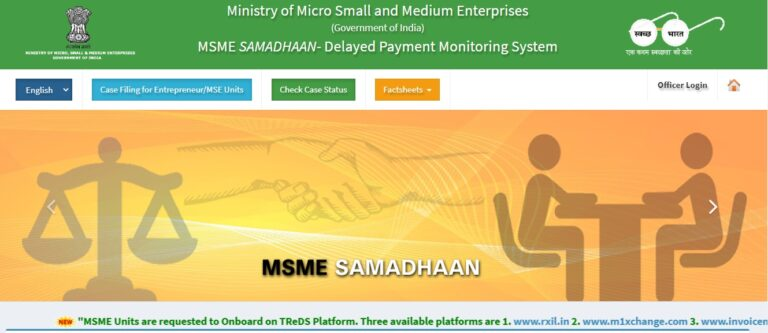MSME ACT: OBJECT & IMPACT
Micro, Small and Medium Enterprises
Development Act, 2006 (In
short “MSME Act”) was enacted with the
object of facilitating the promotion, development and enhancing the
competitiveness of small and medium enterprises. The Act inter alia define “small enterprise” and medium enterprise and provides
for establishment of a National Small and Medium Enterprises Board, besides, it
provide for classification of small and medium enterprises on the basis of
investment in plant and machinery or equipment or establishment of Advisory Committee. What is of
pertinence is that the MSME Act encapsulates provisions for ensuring timely and
smooth flow of credit to small and medium enterprises to minimize the incidence
of sickness in accordance with the Guidelines of Reserve Bank of India (RBI). The MSME Act has faced impediments in
its way, and the object sought to be achieved has been achieved, but only
partially.
THE
PROVISIONS
Chapter
V of the said MSME Act (sections 15 to 24) contains provisions to address the
issue of delayed payment to Micro and Small Enterprises. Section 15 of the Act
mandates that where any supplier supplies any goods or renders any services to
any buyer, the buyer would make the payment for the same on or before the date
agreed, which in any case could not exceed 45 days from the date of
acceptance/deemed acceptance. Section 16 of the Act provides for payment of
interest. Section 17 of the Act mandates that the buyer would be liable to pay
the amount for the goods supplied or services rendered along with interest as
provided under Section 16 of the Act. 10.
Section
18(1) of the Act contains a non obstante clause and enables any party to a
dispute to make a reference to the Micro and Small Enterprises Facilitation
Council (MSEFC).
If
one examines the scheme of the provision of Section 15 to 23 of the Act, it is
apparent that the scheme is to provide a statutory framework for Micro and
Small Enterprises to expeditiously recover the amounts due for supplies made by
them. This is in conformity with the object of the Act to minimize the
incidence of sickness in Small and Medium Enterprises and to enhance their
competitiveness. It is understood that the Small and Medium Enterprises do not
command a significant bargaining power and to thus it is indicated in the
statement of object and reasons of the Act - the object of the Act is, inter
alia, to extend the policy support and provide appropriate legal framework
for the sector to facilitate its growth and development.
ARBITRATION AS PER MSME ACT
It
is, apparently, for this reason that Section 18 (3) does not contemplate an Arbitration
to be conducted by an Arbitrator which is to be appointed by either party, but
expressly provides that the same would be conducted by MSEFC or by any
institution or a centre providing alternate dispute resolution services.
Section
19 of the Act also ensures a more expedient recovery by making pre-deposit of
75% of the awarded amount, a pre condition for assailing the award. It is
necessary to point out that the benefit of this provision is also available in
case of arbitrations in terms of agreements between the parties (and not by a statutory
reference under Section 18 (3) of the Act). As per the law evolved and shall be
discussed subsequently. It is so, as the MSME Act overrides the other law for
the time being in force. Section 24 may be perused in this regard:
Section 24 of MSME Act has Overriding effect-
24.
The provision of sections 15 to 23 shall have effect notwithstanding anything
inconsistent therewith contained in any other law for the time being in force.”
A plain reading of Section 18(2) of the Act
indicates that on receipt of a reference under Section 18(1) of the Act, the
Council [MSEFC] would either conduct conciliation in the matter or seek
assistance of any institution or centre providing alternate dispute resolution
services. It also expressly provides that Section 65 to 81 of the Arbitration
& Conciliation Act (A& C) 1996 Act, would apply to such a dispute as it
applies to conciliation initiated under the Part III of the A&C Act. It is
clear from the provisions of Section 18 (2) of the Act that the legislative
intention is to incorporate by reference the provisions of Section 65 to 81 of
the A&C Act to the conciliation proceedings conducted by MSEFC.
Section
18 (3) of the Act expressly provides that in the event the conciliation
initiated under Section 18 (2) of the Act does not fructify into any
settlement, MSEFC would take up the disputes or refer the same to any
institution or centre providing alternate dispute resolution services for such
arbitration.
LAW:
AS EVOLVED
PIYA BAJWA Vs
MICRO AND SMALL ENTERPRISES FACILITION CENTRE AND ANR. W.P.(C)
1134/2021 & CMAPPL. 3201/2021
The hon’ble Delhi high court in the above case had
occasion to deal with the following communication issued by the Micro and Small
Enterprises Facilitation Council (MSEFC) by which the Petitioner was
called to participate in the conciliation process and also file a reply. The impugned communication issued by the
Facilitation Council dated 31st December, 2020 reads as under:
“The MSEF Council, Delhi is in receipt of a reference filed
u/s 18(1) of the MSMED Act, 2006 by the Claimant M/s Sharp Travels (India)
Ltd., Application/Temp No. DL08E0001555/S/00122 against the outstanding dues of
Rs. 308307 which is to be paid by you to the Claimant. I am directed to inform
you that the MSEF Council, Delhi has decided that the conciliation process
should be taken up first before release of outstanding dues to the Claimant,
failing which a Notice to personally appear before the Council will be served
to you for taking further necessary action in the matter. Further, I am to
inform you that as per Section 16 of the MSMED Act, 2006 the Respondent will be
liable to pay the compound interest with monthly rests to the supplier on that amount
from the appointed day or, as the case may be, from the date immediately
following the date agreed upon, at three times of the bank rate notified by the
Reserve Bank. It is therefore requested to file the reply of outcome of the
conciliation process held between both of you within 30 days.”
The
petitioner in the writ petition had assailed that and pointed out that the
words “decided that” clearly implied that Facilitation Council has taken
a decision in the matter that the Petitioner ought to release the outstanding
dues, whereas the claim is time barred
and thus, such a decision could not have been taken without hearing the
Petitioner. As the claim itself was not maintainable, therefore, proceeding
further was uncalled for. Per contra, it was the contention of respondent that
the mere fact that the Facilitation Council has called the parties for
exploring conciliation in terms of Sections 18(1) and 18(2) of the Micro, Small
and Medium Enterprises Development Act, 2006 does not imply that any decision
was taken. In case, the conciliation process fails then the remedies of the
Petitioners are available in terms of Sections 18(3) and (4) of the MSME Act.
The conciliation process is meant to resolve the disputes between the parties
in an amicable manner. The petitioner therefore cannot be forced to enter into a settlement with Respondent .
ARBITRATION ACT AND MSME ACT: IS THERE OVERLAP?
The
scheme of the MSME Act has been discussed in detail in the judgment of a ld.
Single Judge of hon’ble Delhi High Court in BHEL vs. The Micro and Small
Enterprises Facilitation Centre & Anr., [W.P.(C) 10886/2016, decided on 18th September, 2017]. The Court observed therein as under:
A plain reading of Section 18(2) of the
Act indicates that on receipt of a reference under Section 18(1) of the Act,
the Council [MSEFC] would either conduct conciliation in the matter or seek
assistance of any institution or centre providing alternate dispute resolution
services. It also expressly provides that Section 65 to 81 of the A&C Act
would apply to such a dispute as it applies to conciliation initiated under the
Part III of the A&C Act.
It is clear from
the provisions of Section 18(2 of the Act that the legislative intention is to incorporate
by reference the provisions of Section 65 to 81 of the A&C Act to the
conciliation proceedings conducted by MSEFC. Section 18(3) of the Act expressly
provides that in the event the conciliation initiated under Section 18(2) of
the Act does not fructify into any settlement, MSEFC would take up the disputes
or refer the same to any institution or centre providing alternate dispute
resolution services for such arbitration.
In paragraph 17, it is held that
“It is at once
clear that the provision of Section 18(3) of the Act do not leave any scope for
a non institutional arbitration. In terms of Section 18(3) of the Act, it is
necessary that the arbitration be conducted under aegis of an
institution-either by MSEFC or under the aegis of any “Institution or Centre
providing alternate dispute resolution services for such arbitration”.”
Interestingly,
the Bombay High Court in the case of M/s Steel Authority of India v. The Micro,
Small Enterprise Facilitation Council and Anr. : AIR 2012 Bom 178
held in paragraph 11 of the said judgment, that “we find that there
is no provision in the Act, which negates or renders the arbitration agreement
entered between the parties ineffective”.
The Punjab and Haryana High Court in The
Chief Administrative, COFMOW (supra) had rejected the contention
that provisions of Section 18 (3) of the Act for referring the disputes to
arbitration would apply only where there was no arbitration agreement between
the parties.
However, Punjab & Haryana High Court
in Welspun Corp. Ltd v. The Micro and Small, Medium Enterprises
Facilitation Council, Punjab and others :CWP No. 23016/2011
decided on 13.12.2011, had taken a view contrary to that of the Bombay
High Court. Similarly, the decision of the Madras High Court in M/s Refex
Energy Limited v. Union of India and Another : AIR 2016 Mad139 was also on the
line of welspun (Supra)
The
judgment rendered by Allahabad High Court in BHEL v. State of U.P. and
Others : W.P. (C) 11535/2014 decided on 24.02.2014; the decision of the Calcutta High Court in NPCC
Limited and another v. West Bengal State MSEFC & Ors.: GA No.
304/2017 W.P. 294/2016 decided on 16.02.2017; and the decision of Delhi
High Court in GE T & D India Ltd. v. Reliable Engineering Projects
and Marketing : OMP (Comm.) No. 76/2016 decided on 15.02.2017,
are on similar line and contrary to
Bombay High Court.
The
Calcutta High Court in the case of National projects Construction
Corporation Limited (supra) had also concluded that in cases
where an arbitration agreement existed between two parties and one such party
was an entity within the meaning of the Act, the Council established under the
Act would have jurisdiction to arbitrate the disputes between such parties. The
Court further observed as under:-
“When there exists an
arbitration agreement between two parties and one of such parties to the
arbitration agreement is an entity within the meaning of the Act of 2006, the
Council established under the provisions of the Act of 2006 or any institution
or centre identified by it has the jurisdiction to arbitrate such disputes on a
request being received by such Council for such purpose”.
The
Supreme Court in National Seeds Corporation Ltd v. M. Madhusudhan Reddy
& Anr. : (2012) 2 SCC 506 has held that the MSME Act
being a Special Act would override the provisions of Arbitration and
Conciliation Act, 1996 (hereafter the 'A&C Act').
It is thus
clear through catena of judicial precedents that even when there may be
arbitration agreement between the parties, but in view of non obstante clause
in MSME Act and the fact that the MSME Act is a special enactment, the
provision of MSME Act shall prevail and the arbitration, if allowed to
comm3ence upon failure of amicable settlement, the same shall be under the aegis
of MSME Act only.
OVEREMPHASIS
ON THE WORD SUPPLIER
The MSME
Act however overemphasize “supplier” and “buyer” and buyer is perceived to be
liable, though section 18 somewhat clears the air, in as much as it is
specified that “any party to a dispute” with
regard to any amount due may make a reference for a sum due u/s 17 of the MSME
Act before the Micro and Small Enterprises Facilitation Council (MSEFC). The
classification of “supplier” and “buyer” category is inadequate in as much as
there may be several instance where the buyer may be in receiving ends from a
supplier, which may be a big establishment and may dictate their terms and thus
overemphasis on buyer being liable to supplier is something which deserve a
relook. Similarly, the issue of jurisdiction or exclusive jurisdiction is
somewhat ambiguous under the MSME Act in as much as, whereas the situs of
jurisdiction shall be the location of “supplier” but in similar vein it is also written and buyer all over the country. It
is though vague, whether buyer shall be entitled to raise a claim in their
location itself or not? The section 18(4) may be perused in this regard:
(4) Notwithstanding anything contained
in any other law for the time being in force, the Micro and Small Enterprises
Facilitation Council or the centre providing alternate dispute resolution
services shall have jurisdiction to act as an Arbitrator or Conciliator under
this Section in a dispute between the supplier located within its jurisdiction
and a buyer located anywhere in India.
The
ambiguity, therefore crave for rectification.
REMARK
The MSME Act and MSEFC constituted under it has travelled
some distance and provisions are made in the Act not only to promote MSME
organization, but some leverage is accorded to them for seeking speedy
redressal of their grievance, still, the gaping holes in the Act need to be
plugged and some more teeth may be given to the MSEFC under the MSME Act. Besides,
overemphasis on “supplier” and “buyer” and showing buyer as liable is
incomplete depiction or assumptive of a situation. There may be instance, where
buyers could be in receiving end, though, what is inherent in the Act is that
buyer shall be liable and otherwise also liability upon buyer is fastened in
terms of the Act. This is oversimplification and the aggrieved party needs to
be clearly defined and that could be buyer or supplier or any other entity. The
issue of jurisdiction , particularly, the territorial jurisdiction as per the Section
18(4) of the MSME Act need to be clearly specified to make it more explicit and
to undo the vagueness..
Anil
K Khaware
Founder
& Senior Associate
Societylawandjustice.com









No comments:
Post a Comment